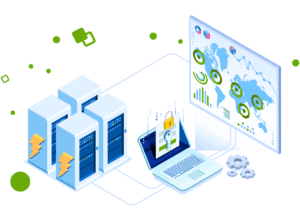Prioritizing Scalable and Efficient IT: How Cloud IT is Revolutionizing Retail Growth

The retail industry is going through a major change with the use of cloud IT solutions. This shift is driven by the need for flexibility and efficiency, which are vital for staying competitive in today’s market.
Key Points on Cloud IT for Retail
- Transformative Impact: Cloud technology brings together operations, simplifies processes, and improves customer experiences, allowing retailers to respond effectively to market demands.
- Scalability and Efficiency: Retailers experience varying consumer demands, requiring systems that can adjust resources as needed. Cloud solutions make this flexibility possible, maintaining optimal performance during busy times and reducing costs related to maintaining infrastructure.
Benefits of Cloud Solutions:
- Increased operational efficiency through automation and real-time access to data.
- Enhanced customer engagement with personalized marketing strategies made possible by advanced analytics.
- Strong security measures leading to compliance and protection of data, building trust among consumers.
Using Edge Cloud Technology in Retail
Edge cloud technology is a system that processes data closer to where it is generated, instead of relying only on central data centers. This method is allows retailers to improve their operations and provide a better experience for their customers.
Edge Cloud Technology for Retailers
Here are some key benefits of edge cloud technology for retailers:
1. Reduced Latency
By reducing the distance data has to travel, edge computing greatly decreases the delay in retail IT systems. This leads to faster transactions, better checkout experiences, happier customers, and fewer abandoned shopping carts.
2. Quick Decision-Making
With localized data processing, retailers can analyze information instantly. This allows them to make timely decisions based on current market conditions, such as changing prices or adjusting inventory levels without wasting time.
3. Improved Customer Experiences
Real-time capabilities allow retailers to personalize interactions more effectively. Immediate access to customer data allows for tailored recommendations, providing shoppers with relevant suggestions at the right moment.
As edge cloud technology continues to develop, it becomes increasingly important for retailers who want to stay competitive in a fast-paced market. The ability to quickly respond using localized data meets consumer expectations and helps businesses grow.
Using Cloud Solutions for Scalable Retail Growth
In the retail industry, being able to scale up or down easily is extremely important, especially with so much competition around. Retailers need to be flexible and adjust to changes in customer demand and market conditions. This is where cloud-native platforms come in handy, as they provide the infrastructure needed to dynamically scale resources and maintain top-notch performance during busy times.
Benefits of Cloud-Native Platforms:
- Dynamic Resource Allocation: Retailers can quickly adjust computing resources based on real-time demands, allowing them to manage traffic surges effectively.
- Cost Efficiency: Pay-as-you-go models enable businesses to avoid over-provisioning resources, reducing operational costs while maintaining flexibility.
- Enhanced Performance: Increased capabilities during high-demand scenarios allow customer experiences to remain positive, reducing cart abandonment rates.
With the ability to seamlessly scale, retailers can respond more effectively to customer trends and seasonal fluctuations. This agility supports growth while building resilience against unforeseen challenges. Cloud solutions empower retailers to focus on innovation and customer satisfaction while maintaining efficiency in their operations.
Enhancing Operational Efficiency through Cloud IT Solutions
Scalable cloud solutions enhance operational efficiency in retail by streamlining processes and minimizing manual intervention.
1. Process Automation
Routine tasks, such as inventory management and order processing, can be automated through cloud platforms. This reduces errors and accelerates operations, allowing staff to concentrate on strategic activities rather than repetitive functions.
2. Centralized Data Management
Cloud solutions provide a unified platform for data storage and access. Retailers can manage sales, customer interactions, and inventory in real-time, leading to better decision-making and a more responsive operation.
3. Automated Updates
Cloud technology facilitates automatic software updates and maintenance tasks. Retailers benefit from the latest features without downtime or manual effort. This keeps systems secure, compliant, and efficient.
4. Improved Resource Allocation
By utilizing cloud capabilities, retailers can dynamically allocate resources based on demand. This flexibility enables optimal performance during peak shopping periods without overextending operational capacities.
Transforming Customer Experience with Cloud-Based Personalization Strategies
Cloud IT solutions enhance customer satisfaction in retail by enabling personalized experiences at scale. Retailers can leverage cloud technology to analyze vast amounts of customer data, leading to tailored interactions that resonate with individual preferences.
Advantages include:
- Advanced Data Analytics: Cloud-hosted analytics tools allow retailers to gather insights from customer behavior, purchase history, and preferences. This enables the delivery of customized product recommendations and promotions, enhancing the shopping experience.
- CRM Systems Integration: Cloud-based Customer Relationship Management (CRM) systems streamline customer interactions. They empower retailers to respond promptly to inquiries and provide personalized support, ultimately fostering loyalty and trust.
- Targeted Marketing Campaigns: With real-time data access, retailers can design campaigns that speak directly to their audience’s needs. This precision increases conversion rates and boosts overall customer engagement.
Ensuring Data Security and Compliance with Cloud Technology in Retail Operations
Safeguarding sensitive customer information is a priority. The rise of digital transactions amplifies the need for robust data security measures to protect against breaches and maintain consumer trust.
Security features provided by reputable cloud providers include:
- Encryption: This scrambles data during transmission and storage, making it inaccessible to unauthorized users.
- Access Controls: These limit those who can view or manipulate data, thereby reducing the risk of insider threats and unauthorized access.
Adopting cloud solutions also aids retailers in meeting regulatory requirements. Compliance features include:
- Data Processing Transparency: Cloud platforms often provide tools that allow retailers to track how customer data is collected, stored, and used.
- Right to Access and Erasure: Built-in functionalities enable retailers to comply with consumer requests related to their personal information.
These capabilities protect customer data and help businesses avoid the financial repercussions associated with non-compliance.
Streamlining Supply Chain Management with Cloud-Based Visibility Tools
Cloud-based solutions have transformed supply chain management in retail by enhancing visibility and coordination.
- Improved Coordination with Suppliers: Real-time data sharing allows retailers to communicate effectively with suppliers, guaranteeing timely order fulfillment and minimizing delays.
- Enhanced Inventory Management: Cloud technologies enable tracking inventory levels across multiple locations. This capability aids in maintaining optimal stock levels, reducing the risk of overstocking or stockouts.
Dynamic pricing strategies are another advantage driven by cloud technology. Retailers can leverage real-time market insights to adjust prices based on demand fluctuations and competitor pricing. For instance:
- Automated Price Adjustments: Using algorithms, retailers can automatically modify prices in response to changes in supply and demand, optimizing profit margins without manual intervention.
- Market Trend Analysis: Cloud-based analytics tools provide insights into consumer behavior and market trends, allowing retailers to make informed decisions regarding pricing strategies.
Incorporating these cloud-based tools streamlines operations and positions retailers to be more agile. The integration of visibility tools allow businesses to remain responsive to customer needs while maximizing their operational efficiency.
Choosing the Right Cloud Provider for Your Retail Business Needs
Selecting the right cloud provider is helpful for retailers aiming to leverage technology effectively. Consider these cloud provider selection criteria:
- Reliability: Check to see if the provider offers high uptime guarantees. Look for at least 99.9% uptime, especially during peak shopping periods.
- Support Availability: Evaluate the level of customer support, including response times and availability of technical assistance.
- Security Measures: Assess the security protocols in place. Strong encryption, access controls, and compliance with regulations.
- Scalability: Confirm that the provider can accommodate your growth. The ability to scale resources dynamically based on demand fluctuations is vital for maintaining performance.
- Integration Capabilities: Check if the cloud solution can seamlessly integrate with your existing systems and applications to simplify your operations.
Embracing the Cloud-Powered Retail Future
Cloud IT solutions for retail growth are no longer just an option; they have become essential. The retail industry is constantly changing, and digital transformation is a major factor.
Here are some key reasons why retailers should embrace cloud technology:
- Efficiency and Scalability: Cloud technology has the power to drive efficiency and scalability in business operations.
- Adaptability to Market Changes: With cloud IT solutions, retailers can quickly adapt to shifting consumer demands and preferences.
- Personalized Customer Experiences: By leveraging data analytics through the cloud, businesses can create tailored experiences for their customers, giving them a competitive advantage.
Investing in cloud solutions enhances operational capabilities while keeping your business flexible, responsive, and prepared for whatever lies ahead.
Frequently Asked Questions About Cloud IT
What is the significance of cloud IT in the retail sector?
Cloud IT is transformative for the retail sector as it offers seamless scalability and operational efficiency, enabling retailers to adapt to market demands swiftly and enhance customer experiences.
How does edge cloud technology minimize latency in retail operations?
Edge cloud technology reduces latency by processing data closer to the source, allowing for faster transactions and improved customer experiences through real-time decision-making capabilities.
Why is scalability important for retailers using cloud-native platforms?
Scalability is allows retailers to dynamically adjust resources based on demand fluctuations, guaranteeing optimal performance during peak periods and maintaining competitiveness.
How do cloud IT solutions enhance operational efficiency in retail?
Cloud IT solutions streamline processes and reduce manual intervention, leading to increased operational efficiency. Automation of software updates and maintenance tasks allows retailers to focus on core business activities.
In what ways can cloud technology improve customer experiences in retail?
Cloud technology enhances customer experiences by enabling personalized interactions at scale through advanced data analytics tools and CRM systems, which provide tailored recommendations and targeted marketing campaigns.
What factors should retailers consider when choosing a cloud provider?
Retailers should consider reliability, support availability, security measures, compliance with regulations, and the overall alignment of the provider’s services with their specific business needs.














